
First Love is the debut Japanese-language studio album by Japanese-American recording artist Hikaru Utada, released on March 10, 1999, by Toshiba-EMI.

Dahlia is the fifth studio album by Japanese rock band X Japan, released on November 4, 1996, by Atlantic Records. It is the band's last album before breaking up the following year, and the last to feature new work by guitarist hide, due to his death two years later. The album is composed largely of ballads, with only a few tracks retaining the band's heavier musical traits seen on previous releases. It topped the Oricon chart and stayed on the chart for only 15 weeks, but managed to sell over half a million copies. Seven, nearly all, of the album's songs were released as singles, most of which also topped the singles chart and sold well.

X Singles is a compilation album released by X Japan on November 21, 1993. It collects all the singles, and their B-sides, released by the band while still named "X" and under contract with CBS/Sony. The album reached number 2 on the Oricon chart, and charted for 35 weeks. In 1994, with 427,860 copies sold, it was the 36th best-selling album of the year. It was later certified Million by the RIAJ. In 2014, Sony Music Japan released a remastered version.
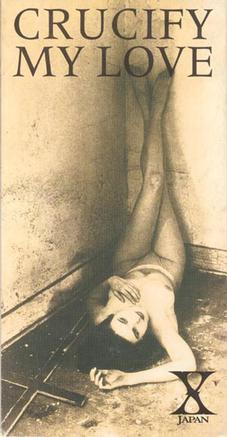
"Crucify My Love" is the fifteenth single by Japanese heavy metal band X Japan, released on August 26, 1996. A power ballad, "Crucify My Love" is written and performed entirely in English, unlike most of the band's songs.

"Silent Jealousy" is a single released by X Japan on September 11, 1991.

"Forever Love" is the fourteenth single by Japanese heavy metal band X Japan, released on July 8, 1996.
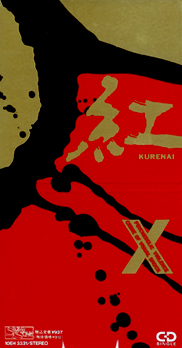
"Kurenai" is a song by Japanese heavy metal band X Japan, written by Yoshiki. One of the band's oldest songs, they have been performing "Kurenai" since 1985, and several versions have been released, most significantly as their major-label debut single on September 1, 1989.

"Week End" is a single released by X Japan on April 21, 1990.

"Endless Rain" is the fourth single released by Japanese heavy metal band X Japan on December 1, 1989. It is their second single on a major record label and reached number 3 on the Oricon chart.

"Say Anything" is a single released by X Japan on December 1, 1991.

Ballad Collection is a compilation album released by X Japan on December 19, 1997. It compiles all the ballads Yoshiki Hayashi wrote for the group. Songs by other members such as "Voiceless Screaming" by Taiji Sawada and Toshimitsu "Toshi" Deyama are not included. The album reached number 3 on the Oricon chart, and charted for 26 weeks. In 1998, with 566,160 copies sold was the 47th best-selling album of the year. It was certified platinum by RIAJ.
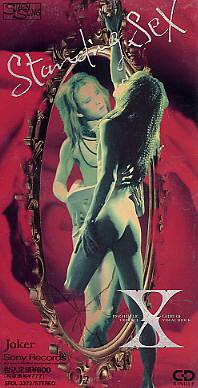
"Standing Sex" is a single released by X Japan on October 25, 1991.

"Rusty Nail" is the tenth single by Japanese heavy metal band X Japan, released on June 10, 1994.
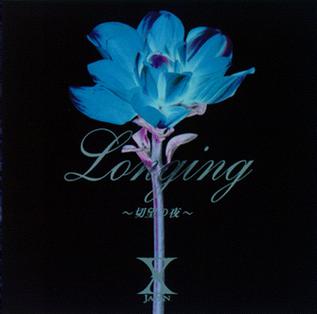
"Longing" is a ballad by Japanese rock band X Japan and written by Yoshiki. The song has been released in several versions, most notably in two different single variations. The first, "Longing ~Togireta Melody~", was released as their eleventh single on August 1, 1995 and reached the number 1 spot on the Oricon chart. The second, "Longing ~Setsubou no Yoru~", is their twelfth released on December 11, 1995 and reached number 5.
"Dahlia" is the thirteenth single by Japanese heavy metal band X Japan, released on February 26, 1996.
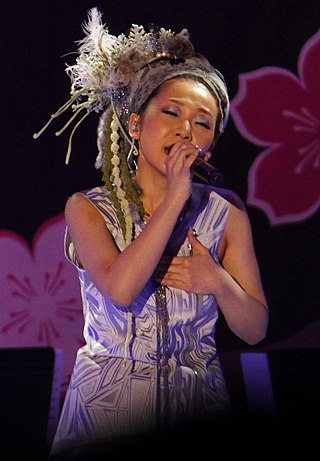
The discography of Japanese R&B singer Misia consists of nine studio albums, three compilation albums, one extended play (EP), one live album, six remix albums, twenty-six singles, twelve promotional singles, eighteen video albums and thirty-seven music videos. In 1997, Misia signed a recording contract with BMG Japan and joined the then up-and-coming talent agency, Rhythmedia. Under the sub-label Arista Japan, Misia released her first single, "Tsutsumikomu Yō ni..." in February 1998, followed by "Hi no Ataru Basho" in May. In June, her debut album, Mother Father Brother Sister, opened at number three on the Oricon chart. The album peaked at number one three weeks later and stayed in the top five for eleven consecutive weeks. Mother Father Brother Sister was certified double million and won a Japan Record Award for Best Album, as well as a Japan Gold Disc Award for Pop Album of the Year. In 2000, Misia's second studio album, Love Is the Message, debuted at number one and was certified double million. It won a Japan Record Award for Best Album and a Japan Gold Disc Award for Pop Album of the Year. The album spawned three top ten hits: "Believe," "Wasurenai Hibi" and "Sweetness." Misia's first remix album, Misia Remix 2000 Little Tokyo, was released three months later and shot to number one. It sold over 800,000 copies and is the second best-selling remix album of all time in Japan.

Perfect Best is a compilation album by Japanese heavy metal band X Japan, released on February 24, 1999. It includes songs that go from their debut album Vanishing Vision to Dahlia, and also an interview with Yoshiki. Some tracks are taken from Live Live Live Tokyo Dome 1993-1996. The album reached number 4 on the Oricon chart. It was certified gold by RIAJ.
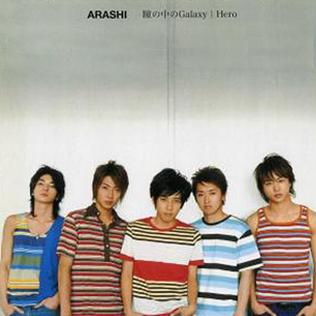
"Hitomi no Naka no Galaxy/Hero" is the thirteenth single of the Japanese boy band Arashi. The single was released in three editions: a regular edition containing a bonus track and karaoke versions of all the songs released in the single, and two limited editions, both containing a DVD with a music video of one of the A-side tracks. The single is the group's third double A-side single, and all the songs included in the single starts with the letter "H".

"Jet Coaster Love" is the third Japanese single of South Korean girl group Kara. The single was originally set to be released on March 23, 2011, but following the 2011 Great Tohoku Earthquake and tsunami disaster in Japan, the physical single was rescheduled to April 6, 2011. In order to help out the areas affected by the disaster, the group had decided to donate all proceeds from the sales of this single, both physical and digital, to relief efforts. It eventually became the group's first single to reach #1 on Oricon Daily and Weekly charts.

"Ai o Komete Hanataba o" is a song by Japanese pop-rock act Superfly. Used as Edison no Haha's theme song, "Ai o Komete Hanataba o" was released as the band's fourth single on February 27, 2008. The song was Superfly's break-through single, breaking into the Oricon physical singles chart's top 20. As of 2011, it is Superfly's most successful single, being certified as a million ringtone download, triple platinum as a cellphone download, and single platinum for digital sales.



















